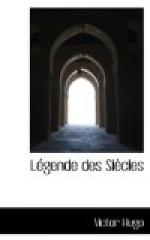au Phare: it is not clear what lighthouse is intended.
une Tarentaise, woman of Tarentum, in South Italy.
Gaete, English Gaeta, a bay and town on the west coast of Italy, north of Naples.
L. 47. The historical allusion here is not clear. Prince Eugene of Savoy, Marlborough’s colleague, and Cardinal Mazarin were not contemporaries.
Livourne, Leghorn. Spinola: the reference may or may not be to the famous Imperialist general in the Thirty Years War.
prames, big flat-bottomed boats, capable of carrying cannon, and used for coast defence.
Notre-Dame de la Garde, a sanctuary at Marseilles.
Palma, a town in Majorca.
APRES LA BATAILLE.
Victor Hugo’s father was an officer in the army of the great Napoleon and fought in Spain as a general, but nothing is known of this incident except what is here told.
Caramba (Spanish), a colloquial interjection, implying surprise and astonishment.
LE CRAPAUD.
To Hugo ugliness was as much a subject for pity as degradation or misery. Compare the following passage from Les Contemplations: Ce que dit la Bouche d’Ombre:—
Pleurez sur les laideurs et les ignominies.
Pleurez sur l’araignee immonde,
sur le ver,
Sur la limace au dos mouille comme l’hiver,
Sur le vil puceron qu’on voit aux
feuilles pendre,
Sur le crabe hideux, sur l’affreux
scolopendre,
Sur l’effrayant crapaud, pauvre
monstre aux doux yeux,
Qui regarde toujours le ciel mysterieux.
For Hugo’s feeling for the brute creation, see Dieu: L’Ange.
Augustules. The last Emperor of Rome, Romulus, was given by the people the derisive nickname of Augustulus, or ‘the little Augustus’. The capture of Ravenna in his reign by Odoacer marks the end of the Western Empire.
vermeils. See note on AYMERILLOT, 1. 35.
miroitait, glittered with light.
farouche, hard, cruel.
fauve, wild, shy. See note on EVIRADNUS, 1. 529.
1. 103. A difficult expression. Apparently it refers to the harsh grating of the wheel against the side of the rut.
connivence: the complicity of the burden upon his back with his master in keeping the ass in a straight course.
I. 134. i.e. the sad and melancholy, such as the ass, are equal to the angels, if they feel pity.
LES PAUVRES GENS. (PAGE 110.)
musoir, the head of a pier or jetty.
vertes couleuvres. The serpent appealed to Hugo’s poetic instinct, and he saw its shape and its glitter in many natural objects. Compare the following passages, for most of which I am indebted to Edmond Huguet’s Metaphores et comparaisons dans l’oeuvre de Victor Hugo:




